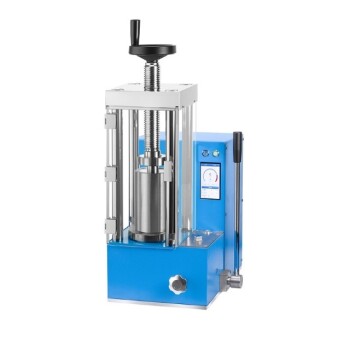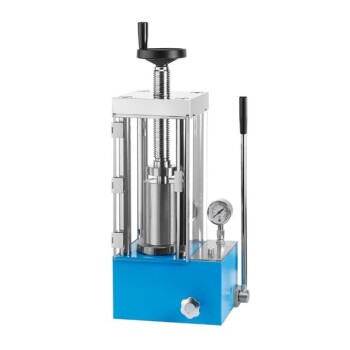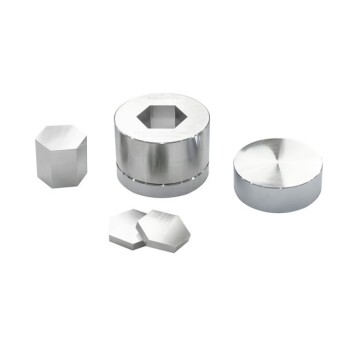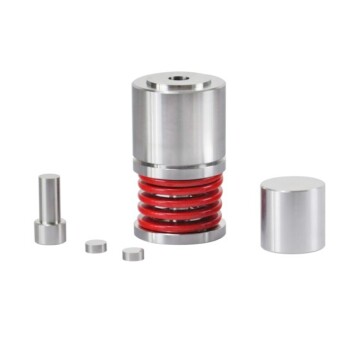At its core, Cold Isostatic Pressing (CIP) is indispensable for industries that require complex, high-integrity components, primarily aerospace, automotive, and medical. It excels at transforming powdered materials into uniformly dense solid parts by applying equal pressure from all directions, a capability these demanding sectors rely on for manufacturing critical, high-performance equipment.
Traditional pressing methods often create internal stresses and density variations that compromise a part's strength. CIP directly solves this by immersing a powdered material in a fluid and pressurizing it, ensuring every particle is compacted equally and resulting in superior structural integrity.
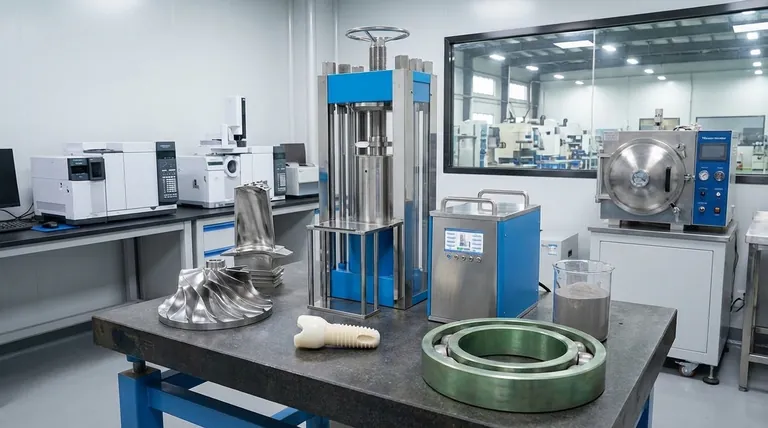
The Fundamental Advantage: Uniformity Under Pressure
What is Cold Isostatic Pressing?
CIP is a material consolidation process. It begins by placing a powder—such as a ceramic, metal, or composite—into a flexible, sealed mold, typically made of rubber or urethane.
This mold is then submerged in a fluid within a high-pressure vessel. The fluid is pressurized, exerting uniform force on the mold from every direction simultaneously.
Unlike traditional uniaxial pressing, which compacts from only one or two directions, this isostatic pressure eliminates the density gradients and internal stresses that cause weak points in a finished part.
The Result: Consistent Density and Strength
The primary outcome of CIP is a "green" part (a part that has been compacted but not yet sintered or fully hardened) with exceptionally uniform density.
This consistency means the part will shrink predictably during the final sintering phase, minimizing distortion and improving dimensional accuracy.
Most importantly, the uniform strength throughout the component is critical for parts that will be subjected to high stress, thermal shock, or corrosive environments.
Why Leading Industries Rely on CIP
Aerospace and Automotive: Mission-Critical Components
In aerospace and automotive applications, failure is not an option. CIP is used to produce high-performance metal and ceramic parts like engine components, bearings, and structural nodes.
The process ensures that these parts have no hidden voids or weak spots, providing the reliability needed for high-stress, high-temperature operating conditions.
Medical: Biocompatible and Complex Implants
The medical industry uses CIP to create complex shapes for dental and orthopedic implants from materials like ceramics and high-strength metal alloys.
The ability to form intricate geometries with uniform density is crucial for ensuring the longevity and biocompatibility of devices that will be placed inside the human body.
Electronics and Manufacturing: High-Purity Materials
CIP is essential for producing sputtering targets, which are high-purity materials used to deposit thin films in semiconductor and electronics manufacturing.
The process is also used to form advanced carbide and graphite components for high-performance cutting tools and refractory materials, where density and wear resistance are paramount.
Understanding the Trade-offs
Precision vs. Uniformity
A common misconception is that CIP produces perfectly finished parts directly from the press. In reality, CIP excels at creating uniform density, not necessarily tight dimensional tolerances in the "green" state.
Parts made via CIP often require final machining after sintering to achieve their precise net shape. Its advantage lies in the part's internal integrity, not its initial external precision.
When CIP Is the Best Fit
CIP is the ideal solution for parts that are too large or geometrically complex for traditional uniaxial presses.
It is specifically chosen when the primary goal is to eliminate internal voids, achieve uniform material properties, and create a strong pre-form for subsequent sintering and finishing.
Wet-Bag vs. Dry-Bag Processing
The CIP process has two main variations. Wet-bag CIP is highly versatile for complex shapes and R&D but has a slower cycle time.
Dry-bag CIP, where the mold is integrated into the pressure vessel, is automated and much faster, making it suitable for the mass production of simpler, standardized parts.
Making the Right Choice for Your Goal
Deciding if CIP is the right process depends entirely on your specific manufacturing priorities and the intended application of the component.
- If your primary focus is maximum structural integrity and uniform density: CIP is the ideal choice, especially for parts with complex internal or external features that are prone to weak points with other methods.
- If your primary focus is producing large components that exceed the limits of traditional presses: CIP provides a scalable and effective solution for creating massive, homogenous green parts.
- If your primary focus is high-volume production of simpler shapes with tight pre-sintering tolerances: A traditional uniaxial press is often a more cost-effective and faster alternative.
Ultimately, leveraging CIP is a strategic decision to prioritize uniform material properties and design freedom over the raw production speed achievable with simpler geometries.
Summary Table:
| Industry | Key Applications | Benefits |
|---|---|---|
| Aerospace & Automotive | Engine components, bearings, structural nodes | High reliability, uniform strength, stress resistance |
| Medical | Dental and orthopedic implants | Biocompatibility, complex geometries, longevity |
| Electronics & Manufacturing | Sputtering targets, carbide tools | High purity, wear resistance, density control |
Ready to enhance your lab's capabilities with reliable Cold Isostatic Pressing solutions? KINTEK specializes in lab press machines, including automatic lab presses, isostatic presses, and heated lab presses, designed to meet the demanding needs of laboratories in industries like aerospace, automotive, and medical. Our equipment ensures uniform density and superior structural integrity for your critical components. Contact us today to discuss how we can support your manufacturing goals and boost efficiency!
Visual Guide

Related Products
- Electric Split Lab Cold Isostatic Pressing CIP Machine
- Electric Lab Cold Isostatic Press CIP Machine
- Automatic Lab Cold Isostatic Pressing CIP Machine
- Manual Cold Isostatic Pressing CIP Machine Pellet Press
- Automatic Laboratory Hydraulic Press Lab Pellet Press Machine
People Also Ask
- How does CIP improve the mechanical properties of refractory metals? Boost Strength and Durability for High-Temp Applications
- What is Cold Isostatic Pressing (CIP) used for? Achieve Uniform Density in Complex Parts
- What are the advantages of Cold Isostatic Pressing (CIP) for pellet preparation? Achieve Superior Density and Uniformity
- What are some specific aerospace applications of isostatic pressing? Enhance Performance and Reliability in Extreme Conditions
- How does Cold Isostatic Pressing (CIP) compare to Powder Injection Molding (PIM) in terms of shape complexity? Choose the Best Process for Your Parts

